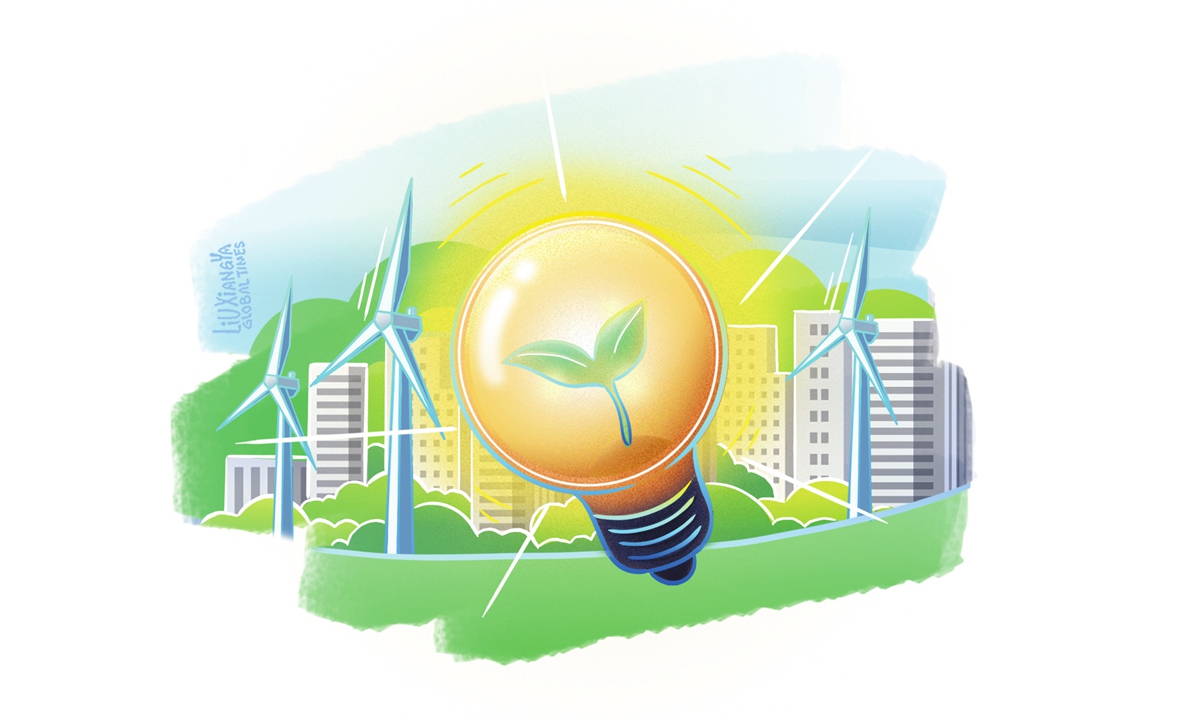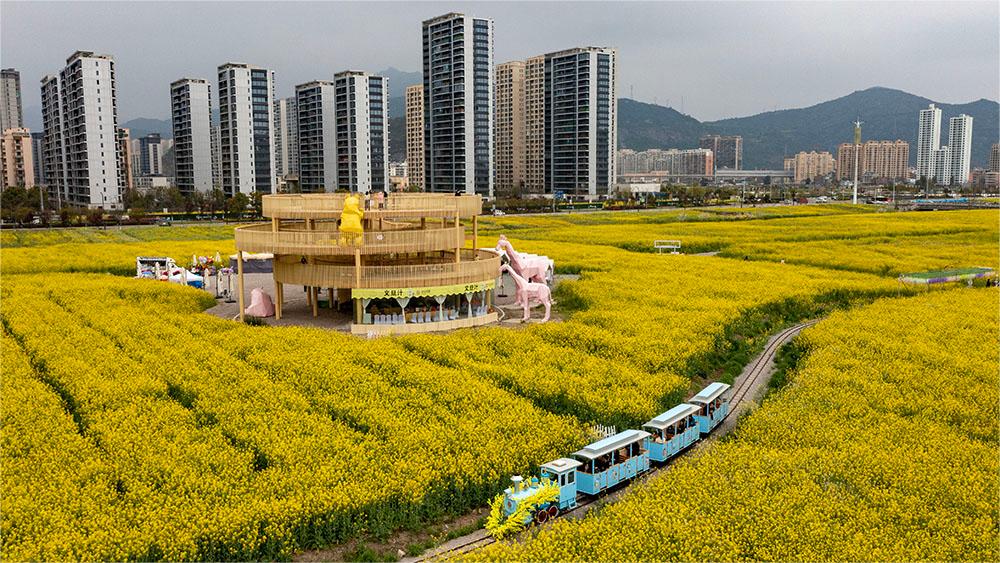China’s advantage in green manufacturing is blessing for climate action

Illustration: Liu Xiangya/Global Times
US Treasury Secretary Janet Yellen on March 27 alleged that a jump in China's green technology exports is "problematic" for the US and the world, particularly at a time when the US is spending huge sums to try to develop green industries including electric vehicles (EVs), solar panels, wind turbines and lithium-ion batteries.
Yellen noted that China's competitive edge in green products exports and the country's massive production capacity will have the effect of "distorting the global economy," and inhibit America's green industry. The logic behind the Biden administration thinking is flawed.
The world is facing drastic changes when it comes to climate patterns, and urgently needs Chinese green-energy products to control carbon dioxide and other greenhouse gas emissions. China's high-quality and inexpensive solar panels, wind turbines and electric cars are well acclaimed by the world.
Washington's longing for China to slow down its green technology innovation and exports in order to give US companies more time to catch up is unwarranted and laughable too. It is a misplaced blame on China because Chinese companies have done something better and more efficiently.
It is true that Chinese-made solar panels, batteries and electric cars are popular around the world, including many countries that form the Global South. Efforts by China to sharpen green technology innovation and accelerate green-energy manufacturing capability are "commendable rather than condemnable," because they are in the best interest of curbing global greenhouse emissions and controlling climate change, while providing more sustainable and renewable energy to more people across continents.
In 2022, US President Joe Biden signed the Inflation Reduction Act (IRA) into law, which is the single largest investment program in American green energy history. The law is aimed to spend $369 billion in energy security and climate change programs over the next 10 years to secure the US' position as a world leader in clean energy production. However, the act specifically excludes import of green goods from China and a few other "selected" countries. All the more, the US government has maintained high tariffs on more than $300 billion of Chinese products. The levies, first imposed by the Trump administration, remain a significant source of tension between the two economic giants.
For many years, unfettered free trade and increasing levels of globalization have acted as the major gravity driving economic growth rates in the world, which has helped pull tens of millions of people out of poverty too. But things seem to change fast. Growing jingoism among the political circles in Washington have led America's political elites to feel increasingly insecure and jittery, and they tend to take all possible measures to suppress Chinese companies, in their desperate attempt to stifle or slow down China's growth.
Although Yellen and other Biden administration officials have claimed the US does not seek to "decouple" from China and the two countries should continue to cooperate economically. But the facts turn out to be different. The Biden administration wants cooperation only in areas where the US believes it can advance its own interests. American officials call for China to collaborate on combatting global climate change, but they are now doing everything in their capacity to stymie China's progress in green innovation and export. Isn't that comical?
Despite the bad faith moves by Washington to cut all cords with China in green technology, visionary American exerts persist that achieving climate control goals requires US' continuous working with China. Kenneth Lieberthal, a senior fellow at the Brookings Institution, said: "The Chinese are ahead of us in (green) technology, they have production capacity that we have not built, they have control over supplies that we do no not have. And they know how to do it, as they put the whole system together."
Nevertheless, the Biden administration is consistently making it difficult to work with China, moving to aggravate the tensions and cracking down on many Chinese companies. The results are damaging for all parties. Free trade and inclusive, integrated global development is at stake now. The path back to robust global economic growth is getting rough and the prospects look increasingly misty. The rope that once holds the world together is severely weakened compared with a decade ago thanks to the US-led protectionism and unilateralism.
In March, the Biden administration moved to impose harsher and more extensive restrictions on the sale of advanced semiconductors, chip-making tools and related products to China, despite the administration's oral pledge to manage tensions through diplomacy and talks. Earlier, the US administration also attempted to clamp down on the flow of money to China too, including banning American investment in AI, quantum computing and other key technology industries that US politicians think could be used to enhance China's industrial capability.
The US' various punitive sanction measures clearly violate normal market rules, sabotaging international trade rules and undermining the stability and resilience of the global production chain. China has strongly suggested the US stop its illicit unilateral sanctioning measures and start to "respect each other's development rights" and seek mutually beneficial business cooperation. China's call most likely will fall on deaf ears, as Washington is unwilling to change course.
To make things possibly worse, the ongoing elevated interest rates and economic weakness facing major Western economies including the US will inevitably be aggravated by America's rising protectionism and technology decoupling. The US response to China's green energy manufacturing advantages is to try to restrict China so that Chinese companies can't export batteries, solar panels and EVs to America. In the end, efforts to combat climate change will stumble and the American people will most likely suffer from the implications.
The author is an editor with the Global Times.
Photos
 Scenery of Yamzbog Yumco Lake in SW China's Xizang
Scenery of Yamzbog Yumco Lake in SW China's Xizang Migratory birds spotted in Karamay, NW China's Xinjiang
Migratory birds spotted in Karamay, NW China's Xinjiang Tourist-dedicated New Orient Express gears up to offer luxury train travel around NW China's Xinjiang
Tourist-dedicated New Orient Express gears up to offer luxury train travel around NW China's Xinjiang Spectacular sea of blooming rapeseed flowers attracts tourists to Yueqing, E China's Zhejiang
Spectacular sea of blooming rapeseed flowers attracts tourists to Yueqing, E China's Zhejiang
Related Stories
- China's energy-rich provinces embark on green, modern development path
- China commits to establishing region-specific environmental management system by 2025
- UN agency issues climate 'red alert'
- Green products seen during Boao Forum
- Boao forum stresses urgency of global response to climate crisis
- China renews blue alert for rainstorms
Copyright © 2024 People's Daily Online. All Rights Reserved.





